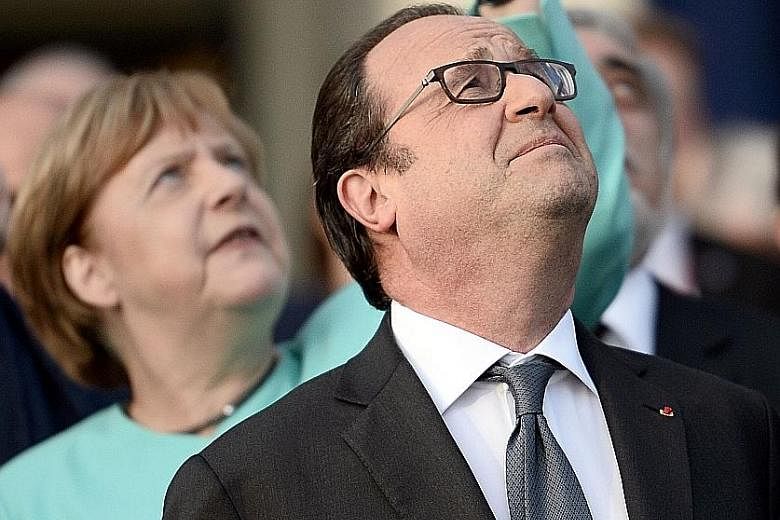WARSAW • Nato leaders united yesterday behind a policy of deterrence and dialogue with Russia after launching the alliance's biggest military revamp since the end of the Cold War to counter a resurgent Moscow.
The allies have also promised the United States they will help fund Afghan security forces to the tune of around US$1 billion (S$1.34 billion) annually over the next three years despite public fatigue in Western countries about their involvement in the long-running conflict.
"One of the great achievements of this meeting is that we now have in place the US$1 billion in non-US commitments," Nato secretary-general Jens Stoltenberg told a news conference yesterday, the second day of the Warsaw summit.
He said that member states "stand together" on Russia, with Nato's eastern flank still nervous after Moscow's shock annexation of Crimea and the Ukraine conflict.
Russian President Vladimir Putin has opposed Nato's decision to put four battalions in Poland and the Baltic states, seeing the expansion into Moscow's Soviet-era backyard as a security threat.
Nato is keen to downplay any divisions, but there have been calls from countries like France and Germany to avoid a Cold War-style stand-off when Moscow's help is needed on issues such as terrorism.
"The alliance is united, we stand together," Mr Stoltenberg said when asked about talks the 28 Nato leaders had on Russia on Friday night. "The united message is that defence and dialogue are what our relationship is based on."
Meanwhile, Prime Minister David Cameron reassured his peers that Britain was committed to the alliance and announced a parliamentary vote on July 18 on revamping Britain's Trident nuclear deterrent to back that up.
"The nuclear deterrent remains essential in my view not just to Britain's security but as our allies acknowledge here today to the overall security of the Nato alliance," Mr Cameron told a news conference.
Mr Stoltenberg announced earlier this week that the alliance would hold fresh talks with Russia on Wednesday as a gesture of the West's openness and good faith.
But French President Francois Hollande appeared to offer more of an olive branch to Moscow, saying on Friday that Russia was neither an adversary nor a threat but a partner.
Asked if he agreed with Mr Hollande, Mr Stoltenberg said there was no "imminent threat" to any Nato ally, adding that Russia was not a strategic partner but neither were they in a Cold War situation.
The United States and European Union have both imposed sanctions on Moscow over the Ukraine crisis but in Europe, in particular, there are growing calls for them to be scaled back.
France and Germany, which have strong political and economic ties with Russia, have played a leading role in efforts to solve the Ukraine conflict, helping to broker the Minsk ceasefire accords.
Nato's unprecedented decision to put 4,000 troops on the ground in eastern member states has meanwhile done much to win over previously sceptical leaders in the region. Lithuanian President Dalia Grybauskaite, a sharp critic of Mr Putin, said a stronger Nato would be better able to talk to Russia.
Mr Putin is, however, unlikely to miss the symbolic importance of the summit being held in Warsaw, the birthplace of the Soviet-era Warsaw Pact, once Nato's adversary.
Moscow bitterly opposes Nato's expansion into its Soviet-era satellites, seeing it as part of an attempt by the West to surround it.
Nato leaders confirmed pledges to fund Afghanistan security forces to combat Taleban rebels who are putting the Kabul government under intense pressure.
Mr Stoltenberg said Nato will keep troops in Afghanistan until next year under its train and advise Resolute Support Mission but could not say when the alliance's longest military engagement might end.
AGENCE FRANCE-PRESSE, REUTERS

